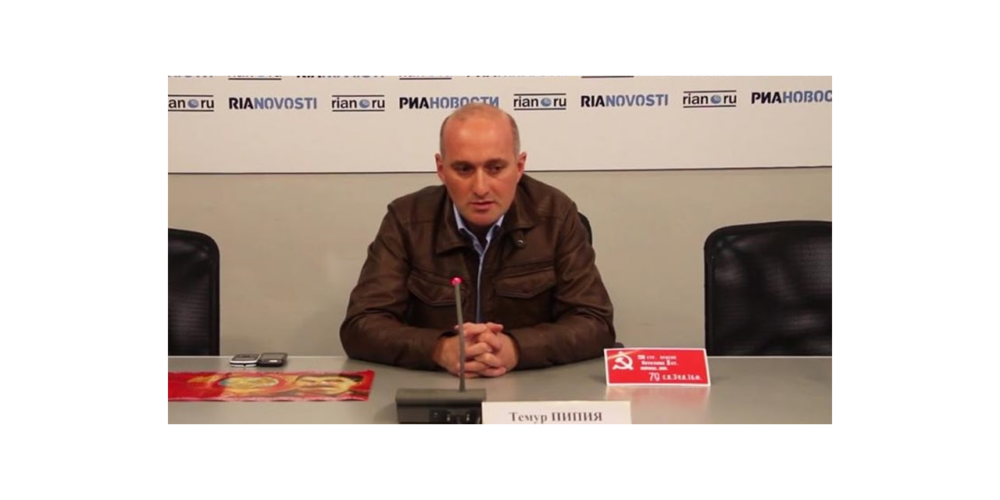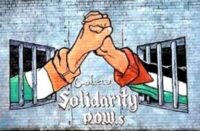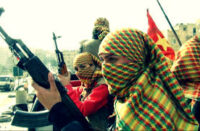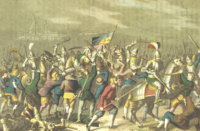Q. What are the biggest ideological legacies that frame the current situation in Georgia. What role for instance, does the legacy of soviet Russia play in Georgian society today, and what has been the impact of the neoliberal turn that really took off in the mid-2000s?
After the collapse of the Soviet Union, in the post Soviet and mainly post socialist countries in Eastern Europe Georgia was created as a successful experiment of neoliberal policies pursued by the West, especially the USA. After 2003 when Georgia had gone through the colour revolution, the government was effectively neo-fascistic. It was almost the same thing in 2003 as what happened to Ukraine in 2014. And the Saakashvili regime amplified the process, he sped up the process of Georgia becoming a neoliberal society. And it came to its logical end, meaning that in nine years Georgia was created as an example of an exemplary neoliberal society for all the post Soviet countries to follow. We instituted classical neoliberal social and economic policies.
The workers were in one of the worst positions imaginable, the Saakashvili regime cancelled the existing labour laws. There was no Labour Code in Georgia during the Saakashvili period. He was proud of this state of affairs where labour had no rights, where the working class had no rights. For example, if you go to the website of invest in Georgia, the first item explains that yes, we have highly skilled workers, but we also have low pay and cheap labour. That’s the biggest thing they are trying to sell to the investors.
After the collapse of the Soviet Union, the social guarantees were already mostly cancelled, but those that remained were also deliberately jettisoned. For example, we had the deregulation of dentists surgeries which created the situation where everyone with a diploma could open up their own clinic and it resulted in an epidemic of hepatitis C, because there was no regulation of hygiene and sanitary standards. They created a liberalisation in favour of private property. The healthcare system was totally privatised after 2003.
In terms of foreign policy, we were exemplary for post Soviet countries in that Georgia became a little Israel in the South Caucasus region. Georgia became one of the main supporters of American imperialism in the post-Soviet and post-socialist space. Georgia took part in every military international operation of natto since 2003. Our soldiers were sent to Iraq, to Afghanistan, we were in Africa, in Serbia.
The central ideological driver in Georgia has been radical anti-communism and anti-Sovietism. The other ideological pillar is Russophobia.
Q. What are the biggest challenges faced by the left and the Unified Communist Party of Georgia today. Could you talk about Saakashvili’s “Charter of Freedom” law that has been in place since 2011?
This law represents the reality that in Georgia anti-communism is elevated to the level of state policy, still to this day. The Saakashvili regime has changed but the law is still there, and is still doing its job. The law is just a representation of all the things that have happened in the past 30 years. Because before this law, the reality for communists was the same under the Saakashvili regime, and before Saakashvili.
The first challenge is to come out from this marginalised position that we are in since the collapse of the Soviet Union. The history of independent Georgia is 30 years old, so the history of Georgia is the history of fighting against communism, total war against communism and the legacy of the soviet past. We have for example, a museum of Soviet occupation in the center of Tbilisi. Its propaganda fosters a common knowledge that we were enslaved and occupied states for 70 years. That we were “victims of communism”! We have constant fear mongering that going back to the Soviet past is the biggest threat to our state.
Q. Could you explain the dynamics of the protests that took place following the introduction of the “foreign agents” bills? Who was in the streets and what were their demands?
We can say that the 8th and 9th of March protest was organised by the Embassy of the US and the whole pro-American platform that exists in Georgia, especially the NGO sector – the direct target of the foreign agents law. It was mostly student youths in the streets. The pro American platforms like NGOs, have infiltrated and hold very strong positions in the universities and higher education system of Georgia. The administration and heads of the private universities are part of this pro American platform, and the Americans have a very strong lobby in the state universities, meaning some of the state universities are also part of this pro-American platform, including the main state university in the centre of Tbilisi. The pro-American platform has financial support from the USA embassy, from the US State Department, and they always give big moral and organisational support. For example, one of the organisers of this protest was the so-called Shame movement which is financed by the NED, the National Endowment for Democracy, which, you know…
These platforms have many kinds of support – moral, financial, political, and organisational.
Periodically the American Embassy invites leaders of political parties and NGOs and they will coordinate actions for the next three to six months ahead. Two years ago the Shame movement had a training session how to create Molotov cocktail, how to protest, and it was public. They had it advertised in the jobs platform – jobs G – for the training session. This shows that the support for the pro-American neoliberal platforms is not as strong as it was, and it doesn’t have support from the ordinary people. The pro-American platform is a neoliberal platform and neoliberalism doesn’t have support anymore from the ordinary masses of people. This is one of the reasons that pro-American parties are now in deep crisis and they can’t even consolidate with each other. For example, we had one of the biggest brains of the neoliberal idea, – Giga Bokeria. He was one of the smartest men in these people’s eyes. His party European Georgia got 0.5%. And this guy was the main ideologue in the Saakashvili regime. This crisis in the pro-American parties is what’s helping today’s ruling party maintain themselves in government.
Q. What role do you see the EU and the West playing in Georgia? There has been a lot of talk about a potential Western backed coup in order to install a more thoroughly pro-EU/pro-West administration – do you think there is any weight to these concerns, and what would be the biggest worry for the Georgian left in such a scenario?
The role of the European Union and the West in Georgia is absolutely destructive. We are sure that they are already planning for this kind of coup. The March protests were an attempt or a rehearsal for this kind of coup. We are sure that we are looking at a similar scenario to Kiev before 2014 euromaidan. The coup will even have a military component, maybe paramilitary, maybe foreign military, but a military component. We see clear symptoms that in this military coup Georgian Military personnel that are now fighting in Ukraine will take part. We don’t have exact numbers but there are hundreds of Georgian military, ex-military and military fighting. There are estimates that there are between 1000 and 3000 of them. We believe that they are getting ready for this coup for 2024, just after or just before. It will be connected with the parliamentary elections in 2024, because they cannot actually win electorally. If this pro-fascist, pro-Western regime is rehabilitated in Georgia, a regime like that of Saakashvili – being a communist, being a socialist, will be very dangerous in Georgia, we will even be in physical danger.
Q. What effects has the war in Ukraine had on the political situation in Georgia, is there concern among the population that conflict could break out in the country? And what is the position of the Unified Communist Party of Georgia in response to the war and has there been any repercussions for your stance? How would you characterise the sentiment among the Georgian people in terms of their orientation towards Russia today?
The first effect was that Georgian society was polarised, and the political situation became very tense and it remains this way. Now we have this pro-American platform activity, the end goal of which is regime change in Georgia so that Georgia will join the anti anti-Russian coalition. The pro-American platform in Georgia and the Kiev regime are very close. The position of the Unified Communist Party in Georgia is that Ukraine as well as Georgia was militarised specially to become the frontline in the East against Russia. That the West were trying to absorb the territory of Ukraine to achieve their military aims and direct their military apparatus towards Russia. And now we know that the Ukrainian army was thoroughly trained. It is clear that the situation would become much more dire if Russia did not intervene. The Russian military intervention in Ukraine was forced. There was also the threat that the Kiev regime would spread its fascist ideology in post Soviet countries. That they will spread this ideology – Russophobia, nationalism, anti-communism, anti-Sovietism, to Georgia and other post-Soviet regions. And in this case, Russia should be seen as a blocking factor of all these aims, these goals.
If Ukraine succeeds militarily and manages to stabilise Kiev, to stabilise itself, we will see a dire picture in post-Soviet countries. We will see the activation of ethnic conflicts, regional conflicts, fascist coups, nationalist groups, not only in Georgia, even in Kazakhstan, even in Uzbekistan, in Armenia, in Azerbaijan. So as the Unified Communist Party of Georgia, unlike several communist parties, we cannot keep a neutral position. We support the ‘special military operation’ in Ukraine.
Of course there are repercussions, we were already falsely accused of being a pro-Putinist party, and now after supporting the special military operation, these accusations have only increased in intensity. In terms of sentiment towards Russia, to clarify, it is sentiment towards the Soviet Union because Russia was the main Republic around which the Soviet Union was formed, in Georgian minds. The Georgian people now understand that there is no way to come out of this economic crisis without economic connections with Russia. Russia is our most important market. We also import and exchange energy with Russia, we import fossil fuels from Russia, 90 percent of our wheat is imported from Russia, there are a range of essential products we import from Russia.
If you were to ask flatly, what percentage of the Georgian people are pro-Russian and how many are pro-Western, I think maybe more are pro-Western. But if you were to ask sub questions, about economics, about social structures, socialism and so on – then we would have different percentages. If the question is asked bluntly like that, bluntly – pro-Russian or pro-European? I think the truth is mostly pro-European. About a million Georgians live in Russia, work there, live there. Yet this does not necessarily mean these Georgians are pro-Russian. We have no direct flight connections for example. Georgian people still need a visa to come to Russia, in spite of the fact that Russian citizens come to Georgia without needing a visa. At present we don’t even have diplomatic relations between Russia and Georgia. No embassies, we communicate through the mediation of Switzerland. This is not a normal situation, Russia is the biggest country in the world, the biggest country is our neighbour.
If you look at the map of Russia you have little Georgia snuggled up against Russia. It’s crazy.
Q. What is the economic situation like in Georgia for workers and what effect has the war in Ukraine had? Are there barriers or difficult challenges to workers organising in Georgia?
The economic situation at the moment, there is stagflation, our wages are stagnant. We have inflation, non stop inflation, and everything is getting much more expensive. If that’s the effect that Ukraine had, we don’t know, because this is what it’s been like for 32 years in Georgia anyway. There has been no stability in Georgia for 32 years. Ukraine has had less of an impact on Georgia because we never joined in on the sanctions on Russia. But in some cases, we didn’t have a choice because in some areas we are in the same system as the West. And we were automatically affected by the sanctions put on Russia. The Swift system, for example.
The barriers to workers organising are that the trade unions are discredited. Second is that they are mostly organised by socialists and socialists are useless, they undermine the unions. Thirdly, if the government wants, it can use its security services and intelligence services against organising workers. For example, there was a strike at a chemical plant in my hometown that was shut down by security services because the chemical plant is considered a strategic asset for the production of fertiliser.
Q. What impact have the Civil Society Organisations and NGO’s had on politics in Georgia, whose interest do they represent when they engage with the political sphere?
There are two kinds of NGOs in Georgia. One is ultra liberal and the second is left liberal. Their aim is not to address the systemic problems but the symptoms of the systemic problems and in the end it amounts to individual assistance or help to someone or some group. If you want to receive assistance from the NGOs you have to present yourself as culturally provocative as possible, which results in a situation where the beneficiaries of the NGOs backing end up creating and addressing their own invented closed loop of cultural tensions. These groups that express themselves in such a culturally radical manner automatically distance themselves from other groups, from their own class. The NGO forces the potential beneficiary to distance itself from their own class and only then, after it provokes cultural tension it becomes eligible to be helped. These can be cultural, ethnic groups, religious groups, identity groups, and the aforementioned dynamic doesn’t emancipate them, it atomises them.
There were two NGOs directly financed by Europe that were organising the protest, the attempted coup in March. These are the Georgian Young Lawyers’ Association and the Centre for Social Justice. These two NGOs and others like them are the reason that class struggle transformed into a cultural tension and cultural struggle with the result that the class cannot consolidate itself.
Q. What is the main activity of the Party at the moment? Could you say a few words about the project that you are attempting to get off the ground?
Our main aim now is to create a platform that will rehabilitate the socialist movement in Georgia. There are some objective realities now that should benefit the socialist movement, because now the populace have started to look to the Soviet past, this has never happened before. This is the first time that the economic tensions have become so bad that people have actually started researching whether it was really that bad in socialist Georgia. We are trying to create a media platform in Georgia which will be mostly online. With this platform we hope to consolidate existing socialists and activate people that have not yet come out as socialists – the latent socialists. There is a very big resource of people disappointed in capitalism, people who critique capitalism instinctively. We will give them actual academic critique, experiences of critique, with discussions, with lectures, to answer those questions they haven’t formulated or asked yet, because it’s taboo to speak about socialism. There is a very big demand in the populace for some kind of power, some kind of force, some kind of information that gives them a vision of an alternative to the structure and system that has been in Georgia since the 1990s. The Communist Party wasn’t able to do this. Even the name is really hard to carry around. It is very hard to work, to struggle under this name – communist – because of the law. We will not change the name of the Communist Party – we will try other tactics, but the Communist Party will remain the Communist Party. Under this socialist umbrella, we will try to gain supporters, the supporters that otherwise wouldn’t come to the Communist Party.






